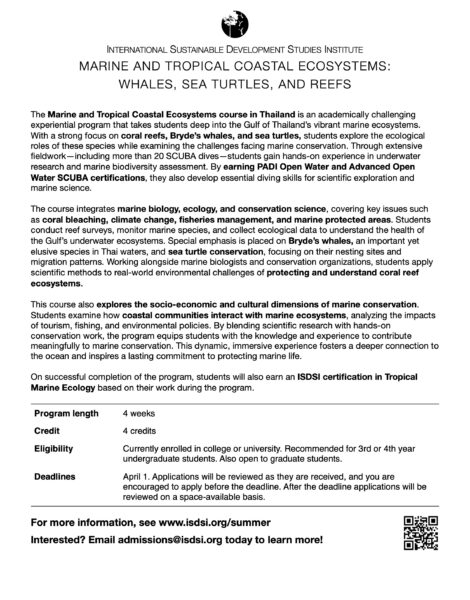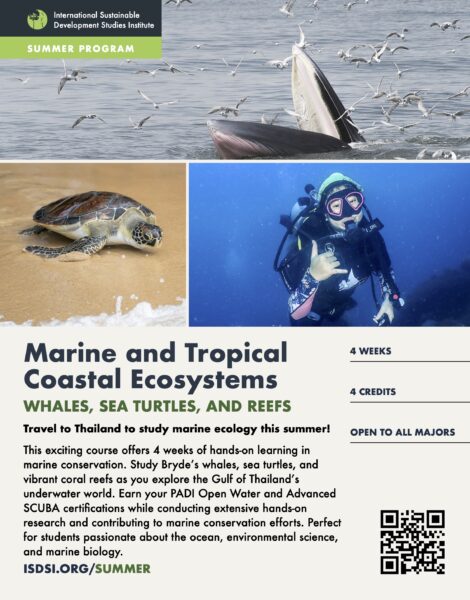Come to Thailand to study tropical marine ecology and conservation!
This program is an outstanding investment in your future as an environmental scientist, marine biologist, or in other related fields! This 4 weeks summer course focuses on tropical marine ecology, and how human/ecosystem interactions impact wildlife and the marine and near-shore ecology. Building on 25 years of experiential studies in Thailand, this course with ISDSI will equip students with an understanding of tropical marine ecology as well as practical research skills.
The Gulf of Thailand is an outstanding place to examine anthropogenic (human) impact on marine and coastal ecosystems. This course will examine in detail three specific issues to better understand larger questions of sustainability, ecology, and the human-nature link.
Course highlights
- Direct observation of marine species (whales, sea turtles, reef fish and corals)
- Independent field research
- Contribute to on-going marine ecology research
- Travel through the coasts and islands of the Gulf of Thailand
- Coral reef research using SCUBA (if you do not have your PADI certification you will earn both Open Water and Advanced Open Water)
- 20+ dives during the course (including certifications and research dives)
- Earn an ISDSI certificate in Marine Ecology
WHALES
One of the key issues globally to helping support and grow marine mammal populations is understating how shipping traffic and other human contact impacts whales, dolphins, and other cetaceans. This course will study Bryde’s/Eden’s whales in the Gulf of Thailand, and talk with and learn from stakeholders in whale conservation, eco-tourism, research scientists, and others.
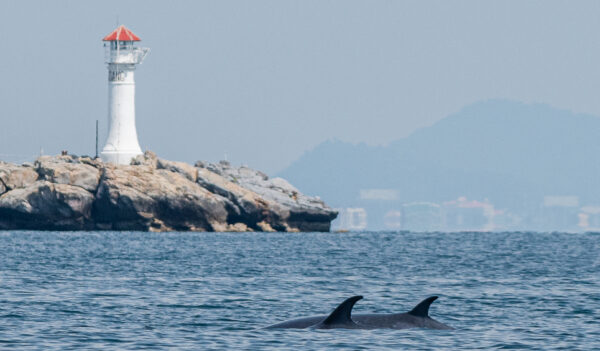
Bryde’s whales off the coast of Thailand.
SEA TURTLES
Sea turtles are impacted by multiple stressors that threaten their populations world-wide. Climate change, habitat loss, pollution, and other factors negatively impact turtle breeding and survival. During this course we will work with and learn from Thai sea turtle conservation efforts to better understand how to best conserve and grow sea turtle populations.
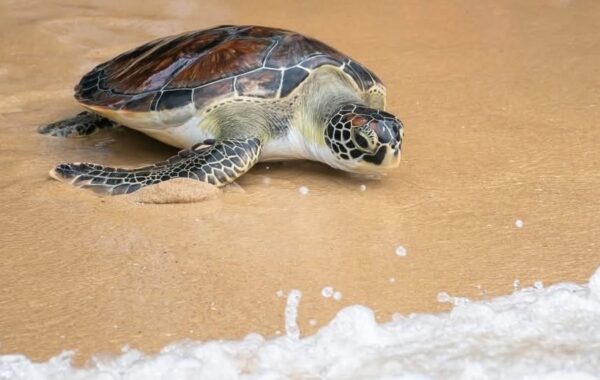
A green sea turtle (Chelonia mydas) heading into the surf in the Gulf of Thailand.
CORAL REEFS
Coral reefs are an important part of global marine ecosystems. During this course we will examine human impact on the reefs, work with international organizations to help study reef health, and learn about reefs and related species that depend on reefs and the role of coral reefs in coastal and island ecosystems.
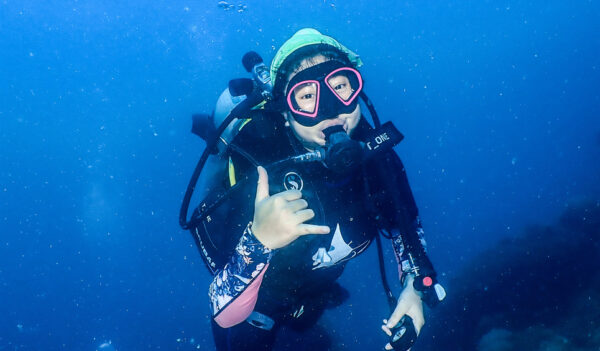
Diving the reefs of Southern Thailand.
Course itinerary
Week 1: Marine Mammals
The course will start in Chiang Mai, Thailand. The course will start with a seminar and overview of the course, before traveling to Bangkok to meet with key stakeholders in marine conservation in the Thai government, as well as international NGOs involved in ocean and marine conservation. We will then travel to a nearby coastal area where shipping/whale interactions are being studied and managed. Students will be observing primarily Bryde’s whales, possibly the elusive Irrawaddy dolphin, and learn from key stakeholders, community members, and scientists.
Week 2: Sea Turtles
The second week of the course will focus on the study of sea turtle conservation, volunteer at a sea turtle conservation program, study sea turtle habitat, as well as study human impacts and pressure on sea turtles. A key part of this week will be understanding local conservation efforts, the role of sea turtles in marine ecology, and the impact of climate change on sea turtle reproduction.
Weeks 3-4: Coral Reefs
The final half of the course will travel to the islands of the Gulf of Thailand to study reef ecology and related species. Students who do not yet have their PADI Open Water and Advanced Open water certification will complete their training, and then all students will complete additional training and certification as needed. After successful certification, students will be working on a study of the reefs around the islands, human impact on the reefs, as well as related reef species.
This course includes extensive diving, and students will complete over 20 dives, including certification dives as well as research dives.
We will also be talking with key stakeholders and community members, studying eco-tourism, sustainable livelihoods, fishing, and the challenges of managing human impact in a popular tourist destination.
We will then return to Chiang Mai for final seminars and presentation of individual student research projects.
Interested in Applying?
Go to our How to Apply to ISDSI Summer Programs page.
Email us at [email protected] if you’re thinking of applying! We can help you with your application and the required materials.
(Photo credits to Wild Encounter Thailand, Department of Marine and Coastal Resources, and ISDSI)
